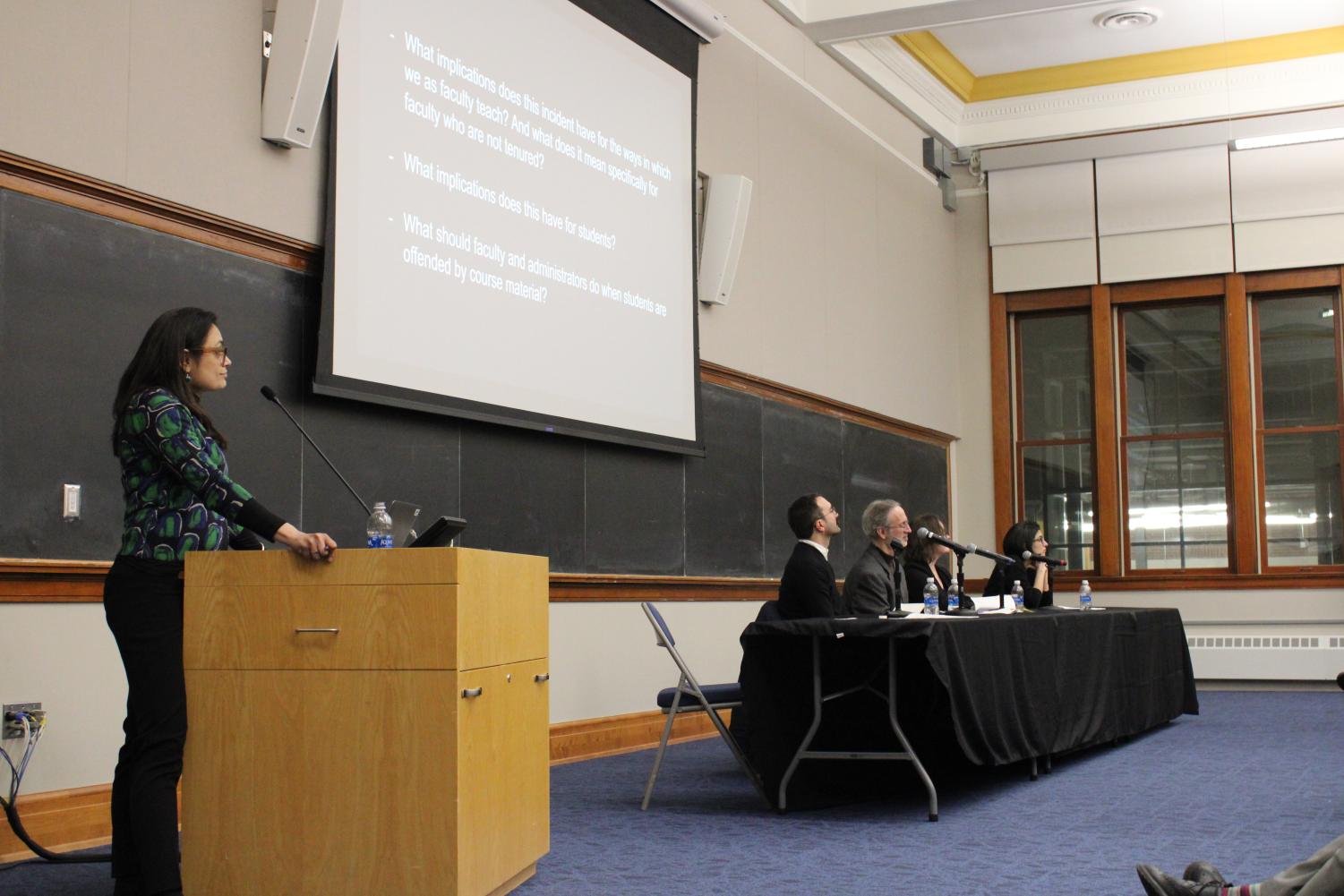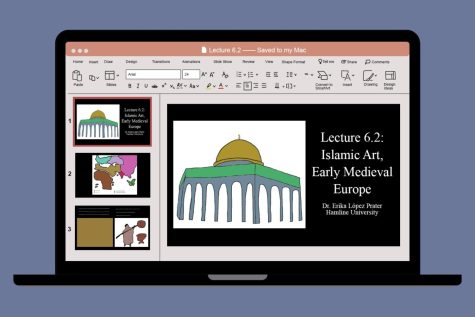Dr. Amna Khalid hosts panel of scholars to discuss Hamline ‘Islamophobic’ incident
Written in collaboration with Aldo Polanco, who is Editor-in-Chief of The Carletonian, Carleton College’s student newspaper.
January 26, 2023

A panel of professors spoke to a packed meeting room at Carleton College on Tuesday, January 17 on teaching Islam and Islamic art. The discussion was held at the Weitz Center for Creativity, a space normally open to the public but unusually restricted to only Carleton community members during the hours of the event.
This event, titled “What Happens When Students Are Offended by Course Materials?” came about in response to the recent controversy surrounding Hamline University’s dismissal of adjunct art history professor Dr. Erika López Prater after she included paintings depicting the Prophet Muhammad in a World Art History class.
In addition to the four professors who had been previously announced as panelists, the event featured an unannounced guest: Dr. López Prater.
The other panelists included moderator Amna Khalid, Associate Professor of History at Carleton; Mark Berkson, Professor and Chair of the Department of Religion at Hamline; Alexander Jabbari, Assistant Professor of Asian and Middle Eastern Studies at the University of Minnesota; and Ahoo Najafian, Assistant Professor of Islamic Studies at Macalester.
After introductions, the panel welcomed a statement from the president of Carleton’s Muslim Student Association (MSA), who criticized López Prater’s in-class use of the painting.
“We as the Muslim Student Association of Carleton see the Hamline incident as unacceptable. We see the college’s reaction to this event was within the guidelines of protecting Muslim students,” the MSA president said.
He continued by arguing that saying López Prater was fired is a “misrepresentation,” and that in reality, she was not re-hired. The student then argued that the professor’s content warnings are effectively asking Muslim students to leave and are”‘not acceptable, harmful and traumatic in many ways.” As the panel continued, all speakers commended the MSA President for his bravery in speaking out.
Berkson repeatedly called out statements from the Minnesota chapter of CAIR, the Council on American-Islamic Relations, alleging that CAIR-MN has taken a “religious stance” that conflicts with their role.
“It is a civil rights organization, their job is to protect, defend and advocate for Muslims. All Muslims. When you make a statement like ‘something’s blasphemous’, you are then excluding all of those Muslims who do not agree with you,” Berkson said.
Several of Berkson’s criticisms echoed a recent statement from the national headquarters of CAIR, which made a distinction between López Prater’s actions and an intentionally offensive act.
“What we find un-Islamic is not necessarily Islamophobic, and we must be careful to distinguish between those two concepts,” CAIR said.
In contrast to its parent organization, CAIR-MN has stayed consistent in its views and started a petition in support of Hamline’s administration and condemning any and all depictions of the Prophet as Islamophobic.
“Displaying the image of the Prophet is intended to communicate hate,” a spokesperson from CAIR-MN said.
When Najafian, Assistant Professor of Islamic Studies at Macalester, was asked by Khalid what the Quran said regarding images of the Prophet, she pointed out that the text does not say anything about depictions of Muhammad, and the belief that those images are forbidden comes from the Hadiths, a collection of sayings from the prophet Mohammad that constitute a major source of guidance for Muslims in addition to the Quran, and which have multiple interpretations.
Hamline’s administrators hadn’t discussed the matter with López Prater in the month between the incident and their first statement describing López Prater’s actions as “undeniably inconsiderate, disrespectful and Islamophobic.” Though Berkson emphasized the need to listen to Muslims when they say they face Islamophobia, he feels it was wrong of the administration to make a statement without any discussion with López Prater.
For López Prater, the conversation with Hamline administrators is just beginning. The panel discussion came just a few hours after her attorneys announced a lawsuit against Hamline University for defamation and religious discrimination.
López Prater shared her worries for other adjunct professors working through the incident’s “chilling effect” with little financial or institutional security.
“This event has demonstrated how few protections [adjunct professors] have,” she said.. “We don’t make a lot of money, we have to cobble together many different jobs and institutions to try to put together a blueprint.”
The panelists also expressed concerns about the effect the event would have on the inclusion of Islamic studies in academia. Jabbari discussed how the Hamline Incident (and others before it) makes Islam a sensitive subject which people may tend to avoid.
“I have been in a room with administrators talking about if we should have a hire for Islamic Studies and I’ve heard people outside of my field saying ‘I don’t know, it’s controversial, it could be a problem,’” said Jabbari. “The ramifications of that are going to be so often ‘let’s just avoid it altogether.’”
Several panelists advocated strongly for nuance and diversity in discussions of Islam.
“I think the idea that 1.7 billion people in the world all share the exact same thoughts, perspectives and are all interchangeable , should be part of our definition of Islamophobia.” Jabbari said.
As an example, Berkson brought up his discussion of LGBTQ issues in Islam when he teaches Islam classes, despite queer acceptance being in the minority. Khalid argued that a unitary, fundamentalist view of Islam is counter to efforts to diversify curricula.
“If we are asking for a decolonizing of knowledge, why are we assuming a position that, to me, smacks of arch-imperialism?” said Khalid. “How does this square with our desire to see different forms of knowledge?”
Najafian and Jabbari went on to argue that fundamentalist views of Islam come from colonialism and that, although academia has been used as a colonial force, academic freedom, inquiry and learning are not Western concepts and should not be treated as colonial.
Upon being questioned by an audience member about the type of person that is made uncomfortable in a religion class, Khalid argued that her position as a South Asian woman in a predominantly white male academic institution has made her more uncomfortable than her peers. She maintained that she has grown more as a result.
Jabbari and López Prater went further to say that discomfort is a part of learning.
“The kind of discomfort that all of us are describing is a kind of discomfort that leads to empowerment,” said López Prater, “It’s within this space of empowerment that I think that the real work of diversity can happen.”




